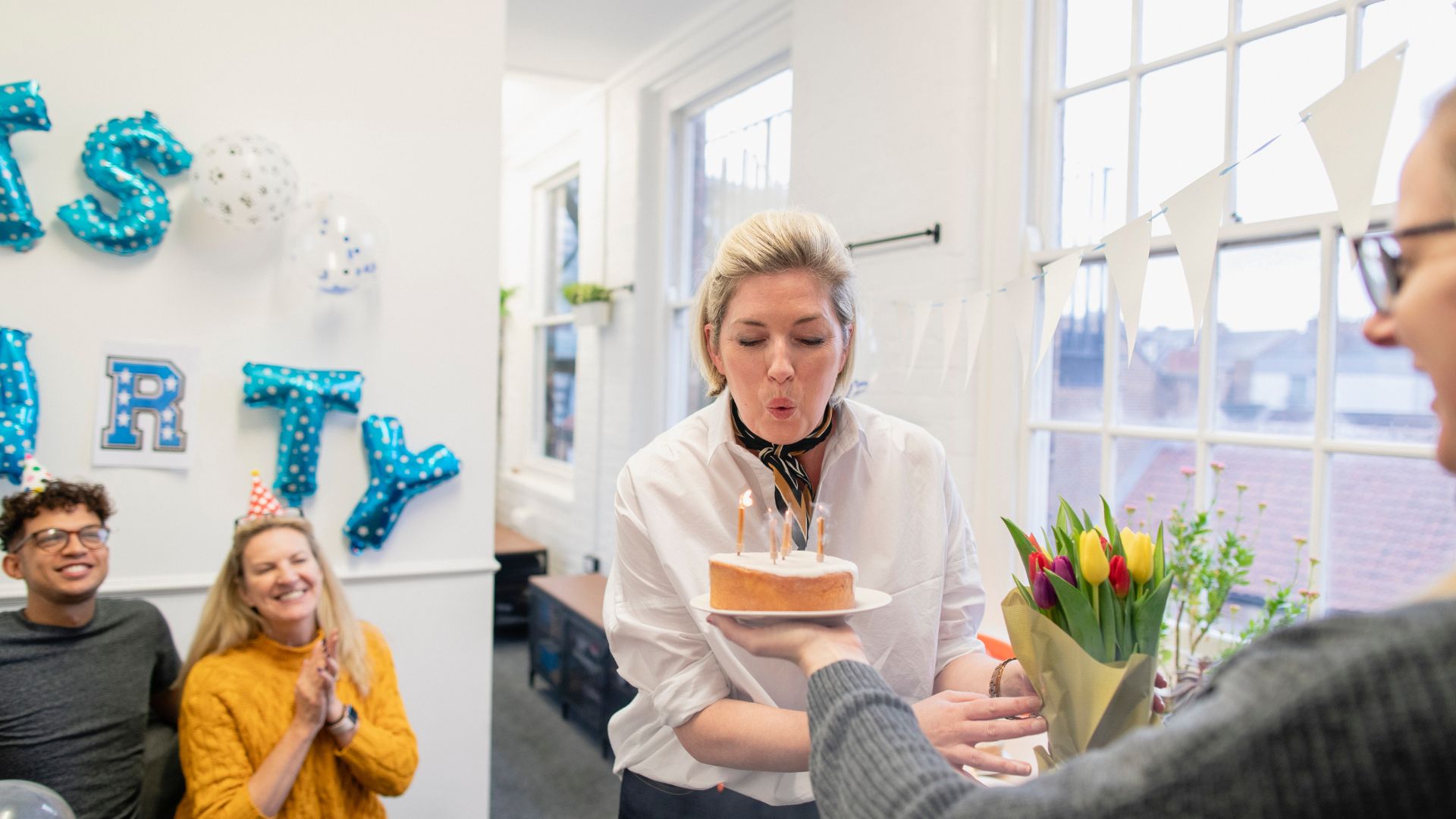The Korean language has many ways to say ‘Happy Birthday,’ each showing a different level of respect. You might use ‘생일 축하해’ with close friends. This is casual and friendly. In more formal settings, ‘생일 축하합니다’ is better. It shows politeness. For elders or those in higher positions, ‘생신 축하드립니다’ is the most respectful. It reflects deep respect, which is important in Korean culture. Understanding these differences helps you speak better Korean and shows you value the culture. It’s interesting to see how language can shape the way we interact with each other.
Different Ways to Say “Happy Birthday” in Korean
Casual Birthday Greetings

Casual birthday greetings in Korean are simple and friendly. The phrase ‘생일 축하해’ (saengil chukahae) means ‘Happy Birthday’ and is perfect for relaxed settings with friends and family. It’s warm and sincere. If you prefer something modern and short, ‘생축’ (saengchuk) is a cool option. It’s an abbreviation that’s popular with young people and on social media. It’s a quick, sweet way to say happy birthday.
- 생일 축하해!
Pronunciation – (saeng-il chu-ka-hae!)
English translation – Happy Birthday! - 생일이야? 축하해!
Pronunciation – (saeng-il-i-ya? chu-ka-hae!)
English translation – Is it your birthday? Congrats! - 오늘 네 생일이네, 즐겁게 보내!
Pronunciation – (o-neul ne saeng-il-i-ne, jeul-geop-ge bo-nae!)
English translation – It’s your birthday today, have a great one! - 생일 축하! 좋은 하루 되길 바래!
Pronunciation – (saeng-il chu-ka! jo-eun ha-ru doe-gil ba-rae!)
English translation – Happy Birthday! Hope you have a good day! - 생일이네! 맛있는 거 많이 먹어!
Pronunciation – (saeng-il-i-ne! ma-sit-neun geo ma-ni meo-geo!)
English translation – It’s your birthday! Eat lots of delicious food! - 오늘 생일이지? 행복한 하루 보내!
Pronunciation – (o-neul saeng-il-i-ji? haeng-bok-han ha-ru bo-nae!)
English translation – It’s your birthday, right? Have a happy day! - 생일 축하해! 소원 다 이루길 바래!
Pronunciation – (saeng-il chu-ka-hae! so-won da i-ru-gil ba-rae!)
English translation – Happy Birthday! Hope all your wishes come true! - 생일이니까 즐겁게 놀아!
Pronunciation – (saeng-il-i-ni-kka jeul-geop-ge no-ra!)
English translation – Since it’s your birthday, have lots of fun! - 네 생일이네, 특별한 하루 되길!
Pronunciation – (ne saeng-il-i-ne, teuk-byeol-han ha-ru doe-gil!)
English translation – It’s your birthday, hope you have a special day! - 생일 축하하고 행복한 한 해 되길 바래!
Pronunciation – (saeng-il chu-ka-ha-go haeng-bok-han han hae doe-gil ba-rae!)
English translation – Happy Birthday, and I hope you have a happy year!
Also Read: Oppa, Hyung, Unnie, Noona: What’s The Difference? A Quick Guide
Polite Birthday Wishes

When wishing someone a happy birthday in Korean, it’s polite to use phrases like ‘생일 축하해요’ (sengil chuka-heyo) or ‘생일 축하합니다’ (sengil chuka-hamnida). These are good for colleagues, distant relatives, or new friends. They show respect and friendliness. Choose ‘해요’ (haeyo) for a bit less formality, or ‘합니다’ (hamnida) for a bit more. This careful choice of words helps maintain good manners and shows you understand Korean cultural norms.
- 생일 축하드립니다.
Pronunciation – (saeng-il chu-ka-deu-rim-ni-da)
English translation – Happy Birthday. - 생일 진심으로 축하드립니다.
Pronunciation – (saeng-il jin-sim-eu-ro chu-ka-deu-rim-ni-da)
English translation – Sincere congratulations on your birthday. - 생일을 맞이하신 것을 축하드립니다.
Pronunciation – (saeng-il-eul ma-ji-ha-sin geo-seul chu-ka-deu-rim-ni-da)
English translation – Congratulations on celebrating your birthday. - 생일을 맞아 행복한 하루 보내시길 바랍니다.
Pronunciation – (saeng-il-eul ma-ja haeng-bok-han ha-ru bo-nae-si-gil ba-ram-ni-da)
English translation – Wishing you a happy birthday and a wonderful day. - 생일 축하드리며, 건강하고 행복한 한 해 되시길 바랍니다.
Pronunciation – (saeng-il chu-ka-deu-ri-myeo, geon-gang-ha-go haeng-bok-han han hae doe-si-gil ba-ram-ni-da)
English translation – Wishing you a happy birthday and a healthy, joyful year. - 생일을 맞아 기쁨과 행복이 가득하시길 기원합니다.
Pronunciation – (saeng-il-eul ma-ja gi-ppeum-gwa haeng-bok-i ga-deuk-ha-si-gil gi-won-ham-ni-da)
English translation – May your birthday be filled with joy and happiness. - 생일을 맞이하여 축복이 가득하시길 바랍니다.
Pronunciation – (saeng-il-eul ma-ji-ha-yeo chuk-bok-i ga-deuk-ha-si-gil ba-ram-ni-da)
English translation – Wishing you a birthday full of blessings. - 생일을 맞아 따뜻한 축하의 인사를 드립니다.
Pronunciation – (saeng-il-eul ma-ja tta-tteu-tan chu-ka-eui in-sa-reul deu-rim-ni-da)
English translation – Sending warm birthday greetings. - 생일을 진심으로 축하드리며, 소원하시는 모든 일 이루시길 바랍니다.
Pronunciation – (saeng-il-eul jin-sim-eu-ro chu-ka-deu-ri-myeo, so-won-ha-si-neun mo-deun il i-ru-si-gil ba-ram-ni-da)
English translation – Sincerely wishing you a happy birthday and all your dreams come true. - 생일을 맞이하여 축하드리며, 행복한 순간이 가득하시길 바랍니다.
Pronunciation – (saeng-il-eul ma-ji-ha-yeo chu-ka-deu-ri-myeo, haeng-bok-han sun-gan-i ga-deuk-ha-si-gil ba-ram-ni-da)
English translation – Congratulations on your birthday, wishing you a day full of happy moments.
Also Read: Explore 35 Unique Ways To Say “Thank You” In Korean
Respectful Birthday Salutations

When wishing a happy birthday to elders or those in higher positions in Korean, it’s respectful to use the term 생신 (sengshin) instead of the more common 생일 (sengil). You might say “생신 축하드립니다” (sengshin chukadeurimnida) to express deep respect. This phrase suits professional settings or when talking to older family members.
If you want something a bit less formal yet still respectful, you can use “생신 축하드려요” (sengshin chuka deuryeoyo). These ways of saying happy birthday show your respect and honor for the person on their special day.
- 생신 축하드립니다.
Pronunciation – (saeng-sin chu-ka-deu-rim-ni-da)
English translation – Happy Birthday (honorific). - 생신을 진심으로 축하드립니다.
Pronunciation – (saeng-sin-eul jin-sim-eu-ro chu-ka-deu-rim-ni-da)
English translation – Sincere congratulations on your birthday (honorific). - 생신을 맞이하신 것을 깊이 축하드립니다.
Pronunciation – (saeng-sin-eul ma-ji-ha-sin geo-seul gi-pi chu-ka-deu-rim-ni-da)
English translation – Heartfelt congratulations on celebrating your birthday (honorific). - 생신을 맞이하여 건강과 행복을 기원드립니다.
Pronunciation – (saeng-sin-eul ma-ji-ha-yeo geon-gang-gwa haeng-bok-eul gi-won-deu-rim-ni-da)
English translation – Wishing you health and happiness on your birthday (honorific). - 생신 축하드리며, 더욱 번창하시길 기원합니다.
Pronunciation – (saeng-sin chu-ka-deu-ri-myeo, deo-uk beon-chang-ha-si-gil gi-won-ham-ni-da)
English translation – Wishing you a happy birthday and continued success (honorific). - 생신을 진심으로 축하드리며, 항상 평안하시길 바랍니다.
Pronunciation – (saeng-sin-eul jin-sim-eu-ro chu-ka-deu-ri-myeo, hang-sang pyeong-an-ha-si-gil ba-ram-ni-da)
English translation – Sincerely wishing you a peaceful and joyful birthday (honorific). - 생신을 맞아 축하드리며, 풍성한 축복이 함께하시길 기원합니다.
Pronunciation – (saeng-sin-eul ma-ja chu-ka-deu-ri-myeo, pung-seong-han chuk-bok-i ham-kke-ha-si-gil gi-won-ham-ni-da)
English translation – Congratulations on your birthday, may you be blessed abundantly (honorific). - 생신을 진심으로 축하드리며, 건강과 행복이 가득하시길 바랍니다.
Pronunciation – (saeng-sin-eul jin-sim-eu-ro chu-ka-deu-ri-myeo, geon-gang-gwa haeng-bok-i ga-deuk-ha-si-gil ba-ram-ni-da)
English translation – Sincerely wishing you a birthday full of health and happiness (honorific). - 생신을 맞이하여 깊은 존경과 축하의 인사를 드립니다.
Pronunciation – (saeng-sin-eul ma-ji-ha-yeo gi-peun jon-gyeong-gwa chu-ka-eui in-sa-reul deu-rim-ni-da)
English translation – On your birthday, I send my deepest respect and congratulations (honorific). - 생신을 맞아 기쁨과 행복이 늘 함께하시길 기원합니다.
Pronunciation – (saeng-sin-eul ma-ja gi-ppeum-gwa haeng-bok-i neul ham-kke-ha-si-gil gi-won-ham-ni-da)
English translation – May your birthday always be filled with joy and happiness (honorific).
Conclusion
In conclusion, learning about Korean birthday traditions helps us connect better with Korean people and appreciate their culture. It’s good to know how to say birthday wishes properly, from formal to casual. This makes our relationships more meaningful. Also, understanding important birthdays and customs like eating miyeokguk (seaweed soup) shows respect for Korea’s deep cultural roots. Whether you’re saying a formal ‘Happy Birthday’ to an elder or a friendly ‘Happy Birthday’ to a pal, each phrase is important. Getting to know these expressions can improve our conversations and help us embrace a wider cultural view, leading to more respect and inclusion in diverse settings. Keep visiting the Translation Blog for more articles like this.

